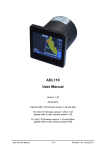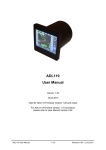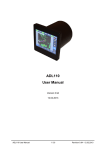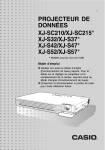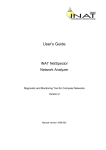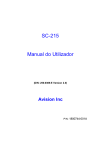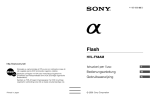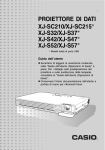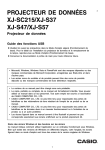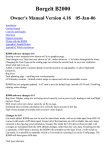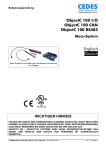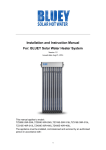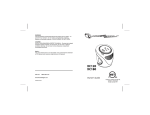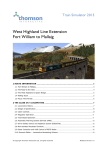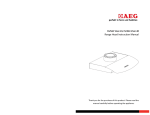Download ODS Overheight Detection System
Transcript
ODS Overheight Detection System Installation & Operation Manual Version 4 ODS Overheight Detection System Installation and Operation of the ODS Overheight Detection System Height control To prevent damages to the structure or equipment of tunnels (lighting, signals, ventilation), it is advisable to control the height of all vehicles at tunnel access for exceeding the headroom. In the normal case, height control at two positions is recommended. At the first position the driver of a vehicle with over height is requested by an active warning sign to leave the road at the next exit. At the second position, light signals will block tunnel access in case of alarm. Schuh & Co. GmbH page 1 of 24 ODS Overheight Detection System The SAM Sensor The SAM laser sensor recognizes even small objects (minimum of 5 cm) at a speed of up to 100 km/h. Roads with a width of up to 32 meters can be controlled for height with an accuracy of 2 cm. Two SAM sensors work as reflection light barriers in the over height detection application. Therefore, an electrical installation is required only on one side. On the opposite side only a passive reflector is to be mounted. Due to special beam widening, adjustment is very simple and there are no problems to be expected from vibrations, the swaying of the supporting pole, or even the thermal expansion of the construction. The Reflector Plate There are 2 versions of the reflector plate available. The basic type and the hood type with better weather protection. Both are equiped with a 2cm high intensity refection stripe, which is additionally covered with an anti dew foil. The ODS-Controller The controller of the over height detection system evaluates the signals from the two SAM sensors and from inductive loops that may be installed in addition, so that false alarms due to birds or falling leaves will be prevented. Furthermore, the signal quality of the sensors is constantly monitored. Any disorder will be reported by a separate output. The output for over height alarm allows to activate flashing lights on warning signs, traffic signs or traffic signaling systems. The ODS-Controller logs all events and provides for the complete documentation of system operation. Schuh & Co. GmbH page 2 of 24 ODS Overheight Detection System Table of Contents 1 Installation – Overview & Quick Guide .............................................................................. 4 2 Components ...................................................................................................................... 5 3 SAM Sensor....................................................................................................................... 5 3.1 Mounting / Adjusting of the SAM Sensors ................................................................ 6 4 The Induction loops, .......................................................................................................... 8 4.1 Loop detector of ODS-Controller .............................................................................. 8 4.1.1 Reset loop detector to factory settings............................................................... 8 4.1.2 Deactivate Loop input ........................................................................................ 9 4.1.3 Select Frequency Band...................................................................................... 9 4.2 External loop detector ............................................................................................... 9 5 The ODS-Controller ......................................................................................................... 10 5.1 Hardware ................................................................................................................ 10 5.2 Software Operation State........................................................................................ 10 5.2.1 Height Alarm .................................................................................................... 10 5.2.2 Error State........................................................................................................ 11 5.2.3 Limit Mode........................................................................................................ 11 5.3 Relay Functions ...................................................................................................... 11 5.4 Log-File ................................................................................................................... 12 5.5 Control of the Input Signals..................................................................................... 12 5.6 Software Menues .................................................................................................... 13 5.7 The serial interface ................................................................................................. 17 5.8 The radio clock........................................................................................................ 18 6 The interface converter.................................................................................................... 19 7 SAMcom Software ........................................................................................................... 20 7.1 Changing the SAM Parameters .............................................................................. 20 7.2 Monitor Operation ................................................................................................... 21 8 Technical Data................................................................................................................. 23 9 Attachment....................................................................................................................... 23 Schuh & Co. GmbH page 3 of 24 ODS Overheight Detection System 1 Installation – Overview & Quick Guide Topic Mount 2 SAMs and the reflector plate • left /right offset SAM1 / SAM2 = 250mm • take care of the controlled height Page 6 Mount ODS-Controller Wire up ODS-Controller: • mains supply • SAM1, SAM2 • Alarm output to control center Only when required connect: • Reset signal from the control center to the input of the controller • Run (operation) output from the controller to control center • Error output from the controller to control center For operation with induction loops: • connect the output of the external loop detector to 'LOOP Extern' terminal strip 7 or if a detector card is built in: • connect the loop wires direct to the terminal strip 'LOOPS' • deactivate unused loop inputs at the detector card Adjust and fix radio clock receiver • LED on receiver flashes once per second • Menu 3.3. 'Adjust Clock' 18 Align each SAM exactly • with a night vision system or an infrared sensitive camera 21 Check signals of the sensors (2 SAMs + Loop) • Menu 3.4 'Monitor Sensors' 12 Simulate too high vehicles to test the system Delete Log file • Menu 2.3. 'Clear Log-File' Schuh & Co. GmbH 13 page 4 of 24 ODS Overheight Detection System 2 Components SAM Overheight Detection System of Schuh & Co. GmbH will be supplied with the following components: 2 Pcs 1 Pcs 1 Pcs 1 Pcs 1 Pcs Laser-Sensor SAM Mounting console reflector plate (200x400mm) ODS-Controller CD with software SAMcom and Twload32 No. SC201 No. SC213 / SC216 No. SC210 / SC215 No. SC223 No. SC240 and, if required 1 Pcs 1 Pcs SAM-PC-Konverter Night Vision rebuild for IR Nr. SC230 Nr. SC231 3 SAM Sensor SAM emits with its infrared laser light impulses in rapid succession. These will be reflected by a reflector fixed on the opposite side of the road. The SAM receiver constantly measures the elapsed time and the brightness of the reflected light. An object between SAM and the reflector will change the measured values. If the changes persist for a set number of impulses, the SAM sensor will activate the output signal. For easy control, there is an LED at the bottom of the casing that lights up when the reflecting strip on the reflector plate is correctly detected. The required supply voltage is 24VDC for the SAM electronic and additionally 24VDC to operate the regulated heating resistor that prevents dew and tarnishing of the lenses. The voltage is normally supplied by the ODS-Controller. The SAM sensor reports the detection of an object over a bipolar RS422 output. The two signal outputs have to be connected to the ODS-Controller. For adjusting and servicing, the SAM also has a RS485 serial communication interface. Using an appropriate interface converter, the SAM can be connected to a PC. All parameters of the SAM sensor can be read and modified with the program SAMcom. The SAM-PC converter is intended for use in the work shop. On site, a PC can communicate via the ODSController with the connected SAM sensors. To make the adjustment at site easier, the SAM is equipped with an additional red laser pointer. This could be switched on in the Service Menu of the ODS-Controller. Schuh & Co. GmbH page 5 of 24 ODS Overheight Detection System 3.1 Mounting / Adjusting of the SAM Sensors The reflector plate has to be mounted, so that the bottom edge of the reflector strip is the same height as the maximum overhead clearance. SAM1 SAM2 The two SAM sensors are mounted at the same height 250 mm apart. The light exit of the SAM sensor is 85mm above the bottom edge of the supplied mounting angle. 85mm For the exact height adjustment a threaded rod is fixed between the tube and the mounting base. 250mm driving direction The lens of a SAM sensor transforms its light beam into a vertical line. The two vertical lines of both SAM sensors have to fall on the horizontal reflector strip exactly, 250mm apart. Ideally, the light beams overlap the reflector strip top and bottom by the same amount. reflector strip laser beam 250mm Warning ! It is absolutely required that the light beams are parallel. They must not cross. Otherwise, the ODS-Controller can not calculate the speed of an object correctly. The correct adjustment of the two SAM sensors is not a simple procedure, but only has to be done once. A deviation in the angle of the light beam by only 0.1 degree, results in 30m distance in a deviation of 5cm. This corresponds to a 0.3 mm turn of the nut on the threaded rod. The SAM sensor works with an infrared laser. Visual adjustment is therefore only possible with a camera without infrared blocking filter or a night vision system at dusk, dawn or in darkness. You will see the beam on the reflector best direct from the position of the SAM. The reflector reflects exactly in 180°. Watching even with a small angle, e.g. 1 meter aside the SAM, reduces the intensity very much. For a coarse adjustment of the SAM the build-in red laser pointer can be switch on by the Menu 3.1. of the ODS-Controller. Schuh & Co. GmbH page 6 of 24 ODS Overheight Detection System As the road surface is not always horizontal the adjusted height must be checked on serveral positions. Schuh & Co. GmbH page 7 of 24 ODS Overheight Detection System 4 The Induction loops, To avoid false alarms as best as possible, the ODS-Controller has additional to the signal inputs for the SAM sensors, also an input for another presence signal, the loop input. With the appropriate ODS-Controller configuration, an alarm will only be triggered when the signals of the SAM sensors are received in correct order and timely sequence and at the same time a presence signal from the induction loops has been received. The important point is, that the presence signal is given without delay (< 40ms ), which requires that the induction loops are positioned more or less directly underneath the SAM laser sensors. The ODS-Controller can operate with built-in loop detector cards or with an external loop detector. 4.1 Loop detector of ODS-Controller Normally the ODS-Controller is equipped with one or two internal loop detector cards able to monitor up to 4 lanes per card. The twisted loop leads are to be connected to the plug (X5) „Loops 1 - 4“ and (X15) „Loops 5 - 8“ The VEK M4C detector has its own micro processor control and can be configured for various applications by keys on its front panel. Used in conjunction with the ODS-Controller, the standard factory settings are being used. Since defective or unconnected loops will be detected as an error, it is necessary to deactivate the inputs of not used loops. Alternatively, the inputs not in use can be supplied with a mini-inductivity (220µH). At the front of the detector there are 8 LEDs and a seven segment display. The green and red LEDs show the state of the corresponding channel. green LED red LED meaning off off Channel switched off fast blinking off Synchronizing on off Loop free on on Loop occupied off blinking Loop error slow blinking Resolved loop error When the detector is in configuration mode, the seven segment display is switched on and the green LEDs indicate the selected channel. 4.1.1 Reset loop detector to factory settings With the following operation steps the factory settings can be restored: • press the MODE key several times in rapid succession until „i“ for INFO function appears on the seven segment display. • hold down MODE key for at least 2 seconds, to confirm selection of the INFOfunction. One after the other, the stored values will be displayed. • While the stored values are being displayed, press down MODE key and keep pressed. For 2 seconds, a blinking „r“ will be displayed. When the display is finished, all detector settings will be reset. Schuh & Co. GmbH page 8 of 24 ODS Overheight Detection System • • • Release the MODE-key. Press SELECT key and MODE key at the same time to leave INFO function. Press SELECT key and MODE key at the same time again to return to normal operation. 4.1.2 Deactivate Loop input Each of the 4 loop inputs of the detector can be configured with the following operation steps: • • • • • • • • press MODE key in rapid succession until „o“ for OUTPUT function appears on the seven segment display. hold down MODE key for about 2 seconds, to confirm selection of the OUTPUTfunction. The current configuration will be displayed. press the SELECT key several times, until just the green LED of the desired channel lights up. press the MODE key several times in rapid succession, until “0” for deactivation or “1” for activation of the channel appears on the display. To store the selected setting, press down MODE key and keep pressed until it disappears from the display. To configure more channels, use the SELECT key to select the channel and the MODE key to set and store the channel setting as described above. Press SELECT key and MODE key at the same time to leave OUTPUT function. Press SELECT key and MODE key at the same time again to return to normal operation. 4.1.3 Select Frequency Band If 2 loop cards are installed in the ODS they have to work with different frequency bands. By resetting the loop card to the factory settings (4.2.1) the frequency band 3 is selected. The second loop card then should be configured to frequency band 1 with the following operation steps: • • • • • press MODE key in rapid succession until „F“ for FREQUENCY function appears on the seven segment display. hold down MODE key for about 2 seconds, to confirm selection of the FREQUENCY function. The current configuration will be displayed. press the MODE key several times in rapid succession, until “1” for the frequency band appears on the display. Press SELECT key and MODE key at the same time to leave FREQUENCY function. Press SELECT key and MODE key at the same time again to return to normal operation. 4.2 External loop detector An external loop detector unit can be connected to the ODS-Controller at (X6) "Loop extern”. As a rule, the presence of a vehicle is signaled by a relay contact (normal open) or an opencollector output of the induction loop processing unit. When there are several lanes, the corresponding normal open contacts have to be connected in parallel. The contacts have to be wired up so that the optocoupler input of the ODS-Controller is powered when a vehicle is detected. Schuh & Co. GmbH page 9 of 24 ODS Overheight Detection System 5 The ODS-Controller 5.1 Hardware The ODS-Controller is a micro processor unit specially designed for this purpose. All modules are inside a splash-proof plastic casing. The electronics provides the following hardware functions: • power supply for internal electronics, and 2 SAM sensors inclusive of heating (input voltage 100-240VAC, 47-63Hz, max 0,9A) • keyboard and display for menu-driven handling of the ODS-Controller • 4 optocoupler inputs for signals from SAM1, SAM2, Loop and Reset • 3 relay outputs (max. 30V, 2A) for run (operation), error, and over height alarm signals, each with a corresponding signal indicator (LED) at the front panel • 2 serial RS485 interface for communication with the two SAM sensors • 1 serial RS232 interface for communication with a PC (9600 Baud, 8Bit, NoParity) • DCF77 radio clock • Watchdog control for imperative reset in case of a software hang up • Fail proof memory for configuration settings and a log book • 2 slots for internal loop detector cards All wiring is done with terminal strips behind the bottom casing cover. The exact terminal connections are specified inside the casing cover and documented in the attachments of this manual. 5.2 Software Operation State The main purpose of the software is the constant evaluation of the 3 input signals from SAM1, SAM2, and loop. When the ODS-Controller is in detection mode, the green LED is lit up, the RUN relay is on and the LCD display is empty. 5.2.1 Height Alarm The over height ALARM state is triggered by the following events, in which case the red LED and the ALARM relay is on: • • • • • ODS-Controller is in detection mode. Both SAM sensors report an object in correct order, i.e. first SAM1 and then SAM2. The time lag between both signals is plausible, i.e. it is between 300 ms and 8 ms which corresponds to an object speed of 3 – 110 km/h There is a signal from the loop sensor related in time to the SAM signals, i.e. the SAM1 signal came no earlier than 120 ms before the detection of the front of the object and no later than120 ms after the end of object detection. In the limit mode (see 5.2.3) one of the 3 sensors may be off. Schuh & Co. GmbH page 10 of 24 ODS Overheight Detection System 5.2.2 Error State The ODS-Controller changes into the ERROR state, which means the yellow LED and the ERROR relay switches on, in case of any of the following events: • One of the SAM sensors reports an object permanently, i.e. longer than 3 seconds. • There are several individual signals from the SAM sensors, that do not comply with the conditions for an alarm, e.g. when it snows. • The internal loop detector card signals an error condition. • One of the sensors is switched off in the menu “Settings / Setup Inputs”. From the ALARM state and from ERROR state, the ODS-Controller returns into detection mode only when no more signals have been received from the sensors for a given time. 5.2.3 Limit Mode If only one of the sensors is defect, the ODS-Controller continues with limited detection ability. This is signaled by the combination RUN and ERROR state with green and yellow LED on. 5.3 Relay Functions Name Bezeichnung Meaning Bedeutung Relay Relais Contact Kontakt LED K3 5/6 green / grün normal or limit detection ON Close ON no detection or power off OFF Open OFF K1 1/2 yellow / gelb SAM Error or Loop Error ON Open ON OK OFF Close OFF K2 3/4 red / rot Overheight / Überhöhe ON Close ON OK OFF Open OFF RUN ERROR ALARM The relay polarity may be changed by customized software. Schuh & Co. GmbH page 11 of 24 ODS Overheight Detection System 5.4 Log-File All state changes are logged with a time stamp in the Log-File. It can be browsed by the menu “2.1. Display LogFile”. Each defect or disabled Sensor is recorded with its number in the Error State Line. 1 = SAM1, 2 = SAM2, 4 = LOOP Combinations are also possible, e.g. 6 = SAM2 + Loop Error. 5.5 Control of the Input Signals In menu "3.4. Monitor Sensors", the inputs of the loop sensor and the SAM sensors can be monitored on the display of the ODS-Controller. After mounting, wiring and justification, it is highly recommended, to check the proper functioning of the 3 sensors with this menu first. Schuh & Co. GmbH page 12 of 24 ODS Overheight Detection System 5.6 Software Menues On pressing the ESC-key, the ODS-Controller leaves the detection mode and is ready for input from a user. The available menus and menu items are described in chapter 5.6. On pressing ESC a second time, the controller returns to detection mode again. When the user fails to do so, the ODS-Controller automatically returns to detection mode after 5 minutes without key board input. For configuration, servicing and testing of the ODS-Controller, there is a numerical keyboard and 4-line LCD display. When in configuration mode, the ODS-Controller will not perform any overheight detection. All configurable settings (parameter) can be selected form the main or from sub-menus. All input will be checked. Wrong or meaningless values will be rejected. For better orientation, the program returns to the main menu after each change. All settings will be retained even in case of a power failure. These are the most important function keys: "DELETE" clears the last input "1" also for "ON" or "Yes" "ESC" aborts input, discharge the change, and leaves the current menu "5" also used for N = "No" "Arrows" go to previous / next item. "9" also used for Y = "YES" "ENTER" confirms input. "0" also used for "OFF" or "No" The settings of the ODS-Controller are correct for standard operation and normally do not have to be modified. The “Settings” menu items are only described for the sake of completeness but should not be changed without prior consultation. In case a menu is entered by mistake, use ESC to leave it again. In the case that settings have been changed by mistake, they standard settings can be restored in menu "1.3. Reset to Defaults". It is no problem, to enter the menu for "Log-Files" and "Service" at any time, as they do not change ODS-Controller settings in any way. Schuh & Co. GmbH page 13 of 24 ODS Overheight Detection System The Menu Mainmenu Submenu Parameter Description 1 Settings 1 Setup Inputs With Loop (Y/N) Specifies whether the loop input should be monitored. If YES, an overheight alarm will be given only if the loop signal also detects a vehicle at about the same time. Default = YES With SAM1 (Y/N) Specifies whether the system works with 2 SAMs. When set to NO, the system will work with limited detection ability using only SAM2 and the loops. (RUN + ERROR) Default = YES With SAM2 (Y/N) Specifies whether the system works with 2 SAMs. When set to NO, the system will work with limited detection ability using only SAM1 and the loops. (RUN + ERROR) Default = YES With DCF77 (Y/N) Specifies whether the system should use the build in radio controlled clock. In case of weak or weak signal reception, the time can be set manually with menu 3.2. Default = YES Comm Test (Y/N) Specifies whether the system should test the communication to the SAMs every time before entering the detection mode. Default = No Menu Timeout [s] Specifies the number of seconds after the system will return to the detection mode automatically. Default = 300 (= 5 minutes) Alarm Time Defines the duration of the overheight alarm in milliseconds. Default = 2000 ( = 2 seconds) SAM Arming Time Defines the time (in milliseconds), the SAM sensors must stay in normal state (no object), before the system will go into detection mode. Default = 2000 ( = 2 seconds) Loop Arming Time Defines the time (in milliseconds), the loop sensors must stay in normal state (no vehicle), before the system will go into detection mode. Default = 0 = not checked Min Obj Time Defines the time in milliseconds a SAM output has to signal an object, before this signal becomes valid. Default = 4 Max Obj Time Defines the maximum time in milliseconds a SAM may signal an object, before it will cause an error state. Default = 3000 ( = 3 seconds) 2 Special Settings Schuh & Co. GmbH page 14 of 24 ODS Overheight Detection System Mainmenu Submenu 3 Reset to defaults Schuh & Co. GmbH Parameter Description Min Gap Time Defines the maximum time in milliseconds a SAM output signal may be interrupted before it will be interpreted as a separate object by the controller. Default = 20 Object Valid Time Defines the maximum time in milliseconds an object detected by a SAM stays relevant. Default = 8000 = 8 Sekunden Min Diff Time Defines the minimum elapsed time in milliseconds between two SAM output signals, to interpret this as a valid object movement (fastest speed) Default = 8 (11 ~ 80km/h, 8 ~ 110km/h, 7 ~ 128km/h) Max Diff Time Defines the maximum elapsed time in milliseconds between two SAM output signals, to interpret this as a valid object movement (lowest speed) Default = 300 (90 = 10km/h, 300 = 3 km/h) Min Loop Time Specifies the minimum duration of the loop signal in milliseconds for a valid vehicle. Default = 10 (84 ~ 3m bei 128km/h) Max Loop Time Not used in this application. Specifies the maximum duration of the loop signal in milliseconds for a valid vehicle. Default = 7200 ( = 7,2 Sekunden) Loop Diff Time Specifies the maximum time in milliseconds the SAM signal may occur before and after the loop signal to give a valid detection. Default = 120 ( ~ 1m bei 30km/h) Limit No Pulses Specifies the number of single pulses from a SAM until the controller will switch into the error state. Default = 5 PlsError Lng Time Specifies the time after that the controller will reset the counter for single pulses. Default = 20000 (= 20 seconds) Malfunc Time Specifies the time after that the controller will leave the error state entered because of single pulses. Default = 6000 ( = 6 seconds) Resets all parameters to their default values. page 15 of 24 ODS Overheight Detection System Mainmenu Submenu Description 2 Log Files 1 Display Log File Displays all log file entries. Use the arrow buttons to go through the log file step by step. To leave the log file display, press the ESC button. 2 Send Log File This menu item will transfer the complete log file to a PC over the serial interface. 3 Clear Log File Clears the log file and starts a new one. 1 SAM Pointer on Switches the red laser pointer of both SAMs on. In this menu item the timeout is extended to 60 minutes. 2 PC-SAM Commun. Allows the communication between a SAM connected to the controller and a PC over the serial interface of the ODS-Controller. 3 Adjust Clock When the radio clock is deactivated, time and date can be set here. When the radio clock is activated (menu 1.1.), synchronisation can be monitored in this menu. 4 Monitor Sensors Shows the detected states at the 3 inputs for SAM1, SAM2 and LOOP. Beeps on every signal change. 5 Test Outputs Allows to switch on/off manually the 3 relays and their corresponding LEDs. 6 SW Update Allows to update the controller firmware over the serial interface. Because this is a critical process, only instructed persons should use this feature. 7 Test Watchdog Omits to retrigger the hardware watchdog. This must lead to a reset of the ODS-Controller after 2 minutes. 3 Service Schuh & Co. GmbH page 16 of 24 ODS Overheight Detection System 5.7 The serial interface The ODS-Controller has a serial RS232 interface for the connection to a PC with a 1:1 cable (9pol. DSub-socket – 9pol. DSub-plug). Only the data signals (TxD, RxD) are used, not the handshake signals. Transmission parameters: 9600Baud, 8Bit, no parity bit, no flow control. In the menus listed below, PC communication is used: Send Log File - Menu 2.2 The log book, in which all important events are recorded with timestamp, can be transferred to the PC. For this purpose, start the Windows program Hyperterminal via „Start/programs/accessories/communication“. In „file/new connection“ the parameters of the COM interface have to be set as specified above. In „transfer/capture text“ the file is specified in which the log book is to be saved and reception is started. Finally, in menu 2.2 on the ODS-Controller the transfer is started. PC-SAM Communication - Menu 3.2. For communication and servicing, the SAM sensors are also able to communicate with a PC. For instance, the alignment of the sensor beam can be controlled in monitor mode of the SAM. Due to the long data cable that are needed, the SAM has a RS485 interface, that cannot be directly connected to a PC. For this interface, the ODS-Controller takes care of the interface conversion. At first, the SAM to be connected to the PC has to be selected in menu 3.1. Then on the PC, the SAMcom software is started. See chapter 7 for program operation. SW Update - Menu 3.6. Please be aware, this is a time critical process that should only be performed by trained personnel! This menu item, provides the upload of a new version of the control software to the ODSController. For this purpose, the program "Twload32.exe" has to be started first on the PC. In „settings/communication“ the used COM-interface with 38400Baud, Even Parity has to be selected. Afterwards, go to menu item 3.6 on the ODS-Controller and start reception by entering the required password _________________. Straightaway afterwards, select the *.TGU file, that contains the new software, on the PC in menu "Programmieren/Modul programmieren". This will start the transfer. The progress of which is monitored on the PC. At the end of transfer, the ODS-Controller automatically resets itself. Schuh & Co. GmbH page 17 of 24 ODS Overheight Detection System 5.8 The radio clock Also included in the delivery of the ODS-Controller is a DCF77 radio clock to which the receiver is connected with a 1m long cable. For a good reception, there are three indicators that help to position the receiver optimally: • A built-in LED light on the receiver has to flash once per second at a constant rate. • Menu 3.3 must not display the message "### Error ###" • The LED on the keyboard lights until the internal clock is synchronized. A change of the direction of the receiver (for instance, by 90°) or its position (for instance by 10 cm) has considerable influence on the quality of reception. After 1 or 2 minutes of uninterrupted reception, the internal clock is synchronized. The LED on the keyboard switches off, the one on the receiver continues blinking. In this state, date and time in the ODS-Controller are absolutely correct. Fix the receiver in the position found in this way. After a reset by the control center or after a power failure, synchronization is started automatically and will take 1-2 minutes to complete. When no position for uninterrupted reception can be found, the radio clock can be deactivated in menu 1.1. Afterwards, the internal crystal clock can be set manually in menu 3.3. The clock is currently only used for the timestamps of the log entries. Schuh & Co. GmbH page 18 of 24 ODS Overheight Detection System 6 The interface converter In the case, that the ODS-Controller is not available, for instance in the work shop, the SAM is able to communicate with a PC over an interface converter. The interface converter changes R485 signals (+-5V) to RS232 signals (+-12V). In addition, an internal timer provides for the switching of the send/receive direction of the RS485 module. The supplied AC adaptor plug is used for the converter itself and to power the SAM. A switchable buzzer will beep if the SAM is not receiving the reflected laser beam, which normally means detecting an object. Interface converter RS232 / RS485 buzzer as detection signal On / Off switch for the buzzer 9pol. DSub socket Connection to PC Connector to SAM AC adaptor plug Schuh & Co. GmbH page 19 of 24 ODS Overheight Detection System 7 SAMcom Software SAM laser sensors have a serial interface to communicate with a PC for configuration, service and testing. Most easily this is done via the ODS-Controller which will do the RS485/RS232 conversion. Alternatively, a connection via the interface converter is possible, as described in chapter 6. SAMcom has to be installed from CD on PC first. Execute the program SETUP.EXE from the SAMcom directory on CD. After installation, the program SAMcom.exe can be called from its installation directory (The default directory is : C:\Programme\SAMcom\ ). Immediately after starting, SAMcom reads and displays the configuration parameters of the connected SAM: 7.1 Changing the SAM Parameters Parameters can be changed by making an input in the corresponding field and then transferring the parameters to the SAM by clicking on the "Store to SAM" button. On delivery, the SAM sensors will be optimally configured according to the application requirements, so that normally, it will not be necessary to change the settings. Therefore, only the two most important values will be described in the following. Schuh & Co. GmbH page 20 of 24 ODS Overheight Detection System Install, Gate used for detection Defines the distance range of the reflector (Gate). Only this gate will be evaluated. Install, Output1 min pulse width Defines the minimum length of the output signal. This means the presence signal is switched on as long as the light beam is interrupted, at least for the minimum length of time in ms. 7.2 Monitor Operation The main application of the SAMcom software is monitoring the level of reception in the various distance ranges (gates). Click on „Monitor“ to open a second window with 3 diagrams and a table. The bottom diagram shows the signal level of up to 12 distance ranges (gates). The SAM-2 uses only the gates 10 – 12. When the SAM has been justified correctly, the level at gate 11 should be constant at about 250. In the gate before and after, the level may be lowered as you can see in the next diagram. For any other gate, no signal should be displayed. As soon as the light beam is interrupted or not correctly aligned to the reflector strip, all signal levels in the bottom diagram are „0“. Schuh & Co. GmbH page 21 of 24 ODS Overheight Detection System Diagram with acceptable but not optimal levels Schuh & Co. GmbH page 22 of 24 ODS Overheight Detection System 8 Technical Data SAM 24V 260 mA Loop Card 24V 85 mA Controller 3 OUTPUT Relays 24V 85 mA max. 30V max. 2A System (2 SAMs, 1 Loop) 24V AC power supply in ODS Controller 100-240V 47-63 Hz 0,9A out 24V max. 1,3A Recommended feeder cable ( without heating 110 mA ) 690 mA UL-LiYCY shielded 10 x 0,56mm² Style 2464/1061 PVC, UV resistant 9 Attachment Schuh & Co. GmbH page 23 of 24 ODS Overheight Detection System 9 Anhang 1. 2. 3. 4. 5. 6. 7. 8. 9. 9 SAM Befestigung (Bilder) SAM Befestigung (Bilder) Konsole für 2 SAMs SAM Außenmaße SAM Reflektorplatte ODS-Controller Außenmaße (Vario-Box) SAM-S Anschlussbelegung ODS-Controller Anschluss Klemmleiste ODS-Controller Anschluss Schaltschema Attachment 1. 2. 3. 4. 5. 6. 7. 8. 9. SAM-S-2 parts for mounting (picture) SAM-S-2 parts for mounting (picture) Mounting console for 2 SAM-S-2 SAM-S-2 outside dimensions SAM reflector plate ODS-Controller outside dimensions (Vario-Box) SAM-S-2 pin layout ODS-Controller terminal connectors ODS-Controller connection diagram Anhang / Attachment ODS Overheight Detection System Anhang / Attachment Seite / Page 1 ODS Overheight Detection System Montage-Konsole für 2 SAMs Bohrungen für die Befestigung an einer Wand Holes for wall mounting Winkel für die Befestigung an einem Mast Bracket for pole mounting Klemmboxen zum Anschluss der SAMs Junction boxes to connect the SAMs Anhang / Attachment Seite / Page 2 ODS Overheight Detection System Anhang / Attachment Seite / Page 3 ODS Overheight Detection System Anhang / Attachment Seite / Page 4 ODS Overheight Detection System Anhang / Attachment Seite / Page 5 ODS Overheight Detection System Anhang / Attachment Seite / Page 6 ODS Overheight Detection System SAM-S-2 Anschlusskabel / pin layout Signal ODS Controller Function 1 Color 2 SAM 3 Flow UP+ 1 rot / red 1 in +24V power supply GND 2 sw / black 2 in Ground Heater + 3 or / orange 12 in +24V power for heater Heater - 4 bl / blue 11 in GND power for heater Sig1+ Presence 5 ge / yellow 7 out RS422 output + normal - if presence = no reflexion Sig1- Presence 6 gn / green 8 out RS422 output - normal + if presence = no reflexion Pointer 7 ws / white 6 in n.c. 8 br / brown 4 ComA 9 vio / purple 9 in/out RS485 bus + serial interface ComB 10 gr / gray 10 in/out RS485 bus – serial interface 11 Schirm / shield Connect to GND = Pointer ON Open = Pointer OFF < ODS Controller SAM-S-2 > Anhang / Attachment Seite / Page 7 ODS Overheight Detection System Anhang / Attachment Seite / Page 8 ODS Overheight Detection System Anhang / Attachment Seite / Page 9



































